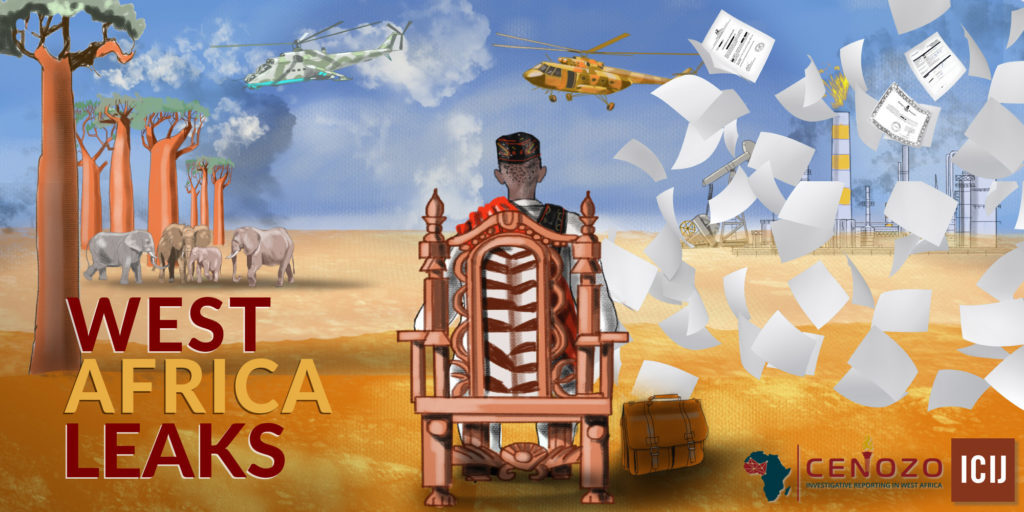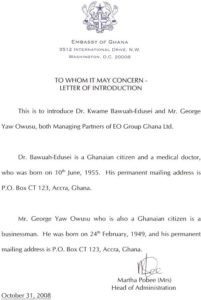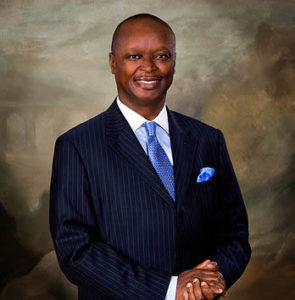West Africa Leaks: Dr. Bawuah-Edusei: A former Ambassador, his offshore companies and a $305m oil deal
 When in June 2007, the then President of Ghana, John Kufuor announced that the country had found oil in commercial quantity; he promised Ghanaians that life would be good. But almost eight years since Ghana became an oil producer it appears – only a few have benefitted substantially– especially those closer to and appointed by him. Among them are a medical doctor and his partner. It is common knowledge that Dr. Kwame Bawuah-Edusei, a former diplomat, is one of the owners of the company known as E.O. Group that held interests in Ghana’s new found oil fields which it later sold, but it hasn’t been known that he was the owner of another company, KG Group.
When in June 2007, the then President of Ghana, John Kufuor announced that the country had found oil in commercial quantity; he promised Ghanaians that life would be good. But almost eight years since Ghana became an oil producer it appears – only a few have benefitted substantially– especially those closer to and appointed by him. Among them are a medical doctor and his partner. It is common knowledge that Dr. Kwame Bawuah-Edusei, a former diplomat, is one of the owners of the company known as E.O. Group that held interests in Ghana’s new found oil fields which it later sold, but it hasn’t been known that he was the owner of another company, KG Group.
Dr. Bawuah-Edusei is a medical doctor based in the United States of America – he runs the Educe Medical Center in Alexandria, Virginia, and has a Foundation called the Edusei Foundation founded by himself and his wife, Evangeline Bawuah-Edusei. The website of the Foundation describes him as Founder, Philanthropist and Humanitarian.
He is also the founder of Educe Capital LLC, which was founded in the United States with branches in Europe and Africa. Educe Capital has an interest in bio-medicine, real estate, and agro processing: to help Africa work her way out of poverty through job creation, his Foundation’s website says.
In 2006 he was appointed Ghana’s Ambassador to the United States by the John Kufuor Administration. Prior to that there are some records showing that Dr. Bawuah-Edusei had served as Ghana’s Ambassador to Switzerland and Austria as well as the country’s permanent representative to the United Nations.
But while serving as Ambassador to the United States and contrary to the Vienna Convention which prohibits diplomats from actively engaging in business outside their home countries, he continued to manage the company known as E.O. Group with his partner George Owusu. The company held a working interest in the West Cape Three Points Deepwater Blocks offshore of Ghana which it later sold to Tullow Oil for $305 million. Leaked documents, including emails from the international offshore law firm Appleby, also show how the $305 million was expended. The Appleby documents were initially published in what was known as Paradise Papers – leaked in 2017.
The documents show that in clear contravention of the terms of his appointment as head diplomat, and a likely case of abuse of office, on October 31, 2008, an official of the Embassy of Ghana in Washington DC wrote a letter to Appleby introducing him and his partner as Managing Partners of E. O. Group. E. O. Group is registered in the Cayman Islands and the leaked documents show it is wholly owned by E. O. Holdings which in turn is wholly owned by the two men in a complicated business structure registered in an offshore jurisdiction. The two men share a common address; Clifton House, 75 Fort Street, P. O. Box 1350, George Town, Grand Cayman.
Several other documents available, including a certificate of incumbency and letter of consent show the two men as directors of E. O. Group.
Meanwhile, in email correspondence among Appleby staff in 2008, also contained in the leaks, Dr. Bawuah-Edusei was described as Ghana’s Ambassador to the United States.
But the letter written by the Embassy of Ghana in Washington DC, on October 31, 2008 and signed by the then Head of Administration, Martha Pobee, seemingly obscures his formal position as Ambassador. It introduced Dr. Bawuah-Edusei as a Ghanaian and medical doctor with his date of birth and permanent address – a mailing address at Cantonments in Accra.

Mrs. Pobee is currently Ghana’s Ambassador and Permanent Representative at the United Nations.
When ghanabusinessnews.com reached Mrs. Pobee on the phone May 8, 2018 she gave the following response: “Part of the duties of any head of chancery, in charge of administration, is you do an introductory letter for the person. I have no knowledge of whatever details existed between Kosmos and E.O. I don’t know. I didn’t know.”
She adds, “If you are a diplomat, that doesn’t stop you. I don’t think the laws in Ghana stop you if you are an Ambassador from having your own private business. We have rules and regulations that don’t stop you. There is nothing wrong with that.”
Mrs. Pobee’s response unfortunately did not address the question of whether it was proper for an Ambassador to actively court business in the host country and whether this violated international covenants.
The letter also introduced George Owusu as a Ghanaian and a businessman with the same Cantonments postal address. As part of their roles, foreign missions abroad do write letters introducing their citizens seeking to do business with counterparts in the host country, some Foreign Ministry staff have told ghanabusinessnews.com. But writing a letter to introduce a serving Ambassador, multiple sources we have spoken to have described as a situation of conflict of interest.
Commenting on the contents of the letter that obscured Dr. Bawuah-Edusei’s position as Ambassador, a senior official of one of Ghana’s Missions abroad, said if the official in question signed the letter as Head of Chancery then the official “crossed the line.”
Adding, “Head of Chancery cannot introduce Head of Mission without introducing the capacity. Contents of the letter can implicate them collectively.”
This official further stated that some diplomats are known to do business in third countries using ordinary passports, in which case they have no immunity and taxes and all other legal obligations apply to them.
However, Dr. Vladimir Antwi-Danso, a professor of international relations and diplomacy, who has taught for several years at the University of Ghana disagrees. He told ghanabusinessnews.com on the phone that Ambassadors are not allowed to do business. He indicated that because diplomats are under immunity, doing business is not allowed. “You can’t enter his premises; you can’t take the diplomat to court. The Convention that gives the diplomat immunity to serve, does not allow them,” he said.
On diplomats doing business in third countries, Dr. Antwi-Danso pointed out that when diplomats run into trouble in host countries they are allowed into a third country where they have immunity, and so doing business in a third country raises moral questions.
“Head of Chancery cannot introduce Head of Mission without introducing the capacity. Contents of the letter can implicate them collectively.”
Kabral Blay-Amihere who served as Ghana’s Ambassador to Liberia and Sierra Leone under the same administration says in his view, diplomats are not permitted to engage in active business while at post, because it is wrong, and it is not possible to do so. “It is unethical, indeed it is corruption,” he said, adding that “You can’t do the two. And for a Head of Chancery to write a letter introducing an Ambassador without stating his position, they might be hiding something,” he said.
Anthony Duke, a Ghanaian living in New York, who grew up with a diplomat father says, “serving diplomats are not allowed to do business in the country of their respective mission, neither are their accompanying dependents unless the country issues a separate permit that allows the spouse for instance to take up gainful employment.
There is not one common standard that is applicable. It will be country to country. Nevertheless the unwritten rules on conduct for diplomats will be that they stick to the very reasons for which the host country issued them a visa or permit of stay.”
A US expert also told ghanabusinessnews.com that diplomats cannot have other paying jobs because that is why they are given diplomatic immunity – they are protected because they are expected to only work in their official diplomatic job.
Speaking to ghanabusinessnews.com, an employee of the Ministry of Foreign Affairs, who was not authorized to speak to the media, said such business dealings contravene the Vienna Convention on Diplomatic Relations and Optional Protocols. The Convention signed in Vienna on April 18, 1961 sets the rules for diplomatic relations and the conduct of diplomats in host countries.
Section 42 of the Convention states: “A diplomatic agent shall not in the receiving State practice for personal profit any professional or commercial activity.”
Despite efforts – including a visit, phone calls, emails, and a letter delivered by hand to the Information and Public Affairs Bureau of Ghana’s Ministry of Foreign Affairs seeking clarification on what the standard practice is – no response has been received more than a month after the initial contact and a promise from the Director of the unit to respond to the set of questions.

Dr. Bawuah-Edusei has widely been known as a co-owner of E. O. Group. But he is also the CEO of another company known as KG Group, the registeration documents contained in the leaks show. He registered KG Group in the Cayman Islands for just one discernable purpose – to transfer the interests of E. O. Group to the new company before the utilization and development of oil in the Jubilee fields – that is to say before the production of oil from the field, email communications between Appleby staff show. No documents were found to show what else KG Group engaged in and or what happened to the company as there are no records to show that the assets of E. O. were ever transferred to KG.
In one of the correspondences, the last of the 20-point-email, states; “The principals of E.O. Group have decided to set up an offshore company in the Cayman Islands and to cause E. O. Group to transfer its interest in the West Cape Three Point (WCTP) Block to the new entity before the unitization and development of the discoveries begin.” The emails, which describe Dr. Bawuah-Edusei and George Owusu in detail, also describe their relationship which in 2008 had been going on for 15 years. It also details how the two registered E. O. Group Limited as a limited liability company organized and existing under the laws of Ghana in 2002. It states further how the two men facilitated the arrangements for Vanco Energy Company officials to meet with Ministry of Energy and Ghana Petroleum Corporation (GNPC) in Ghana. The emails also show how, when in 2002 E. O. Group was searching for investors to partner with it to invest in Ghana’s oil sector, Ennex International, an Irish Company agreed to partner with E. O. Group and endeavor to capture the West Cape Three Points Block.
According to the emails, “Through E. O. Group’s persistence, E. O. Group was able to obtain from GNPC a few seismic lines pertaining to the WCTP Block.”
Politically exposed person
While there are documents showing that due diligence conducted by Appleby concluded that Dr. Bawuah-Edusei was not in a conflict of interest situation, Appleby raised a red flag over him as a politically exposed person or PEP. PEP is a prominent person in the political, diplomatic, military or judicial realms – who, through his or her prominent position or influence, is more susceptible to being involved in bribery or corruption.
Appleby therefore included his name in a list of some 300 PEPs.
The complex business structure of E. O. Group
The two men, according to documents, contemplated a complicated structure for E. O. Group. A memorandum written on December 13, 2011 shows the ownership structure of E. O. Group registered in multiple offshore jurisdictions and who the final owners are and how the assets of the company would be distributed should the need arise.
The memo from Appleby to McGuire Woods London LLP to the attention of one Daniel J. Burns under the title EO Group (“EO”) Distribution of assets: states that EO is wholly owned by EO Holdings Limited (“Holdings” and together with EO the “EO Companies”). Holdings is wholly owned by Dr Kwame Bawuah-Edusei (“Kwame”) and George Yaw Owusu (“George”). Kwame and George are the sole directors of each of EO Holdings.
The memo states that George and Kwame contemplated implementing a corporate restructuring of the EO Companies. It adds that the result of the restructuring would be that EO would remain wholly owned by Holdings but Holdings would ultimately be wholly owned by a Cyprus entity which in turn would be wholly owned by a Luxembourg S.a.r.l which in turn would be wholly owned by George and Kwame.
It is curious that an Ambassador representing his country would contemplate this ‘layered’ structure for his business which seems designed to permit externalization of profits to a jurisdiction where taxes on profits or capital gains are far lower than Ghana.
The corporate structure adopted by Dr. Bawuah-Edusei to house his interests in Ghana’s oil wealth appears to have several layers ending in the same two beneficial owners. One of the potential tax benefits of a structure like this is that profits from the sale of Ghanaian oil owned by a Ghanaian company, E.O. Group, could be shifted to companies in secrecy jurisdictions like the Cayman Islands and Luxembourg. In situations where this is done, a company or individual’s tax obligation is artificially lowered. While it may be a legal scheme, it is not the sort of example one would expect a senior diplomat to set for the local business community. But then again, breaking ethical norms in order to advance his own business interests is something Dr. Bawuah-Edusei’s stint in the diplomatic corps in Washington DC suggests he is prepared to do.
All attempts to get a response from Dr. Bawuah-Edusei were unsuccessful. We sent emails to his contacts available in the leaked documents but didn’t get any response. We then tried the phone numbers on his Foundation’s website as well as the email addresses, but none went through. We then sent a written letter which was hand delivered to his Florida address which is also the address of his Foundation and still got no response.
How the $305 million was shared
The memo also interestingly sets out how the $305 million that E. O. Group made from selling its share to Tullow was shared. About $95 million was paid to E.O. upon signing the Sale and Purchase Agreement (SPA) with Tullow Oil, of which about $80 million was immediately used to pay certain creditors of E. O. The identities of these creditors were not revealed in the documents. Certain shares in Tullow representing about $210 million were placed into an escrow account known as the ‘Tullow Share Consideration’ which the memo says would have been released to EO after January 31, 2013. It appears E. O. ceased operations after it was paid by Tullow. Emails from Appleby show that its officials did not respond to requests to file annual returns.
In 2011, Texas-based oil producer, Kosmos Energy, in a filing with the Securities and Exchanges Commission in the US indicated that E.O. Group owed it a sum of $61.7 million in development costs. At that time EO had missed the payment schedule period of December 2010.
According to Kosmos Energy, the money for Development Costs on the oil fields was paid on behalf of EO. Kosmos Energy indicated that under what is termed as the EO Participation Agreement, it was entitled to reimbursement for the development capital expenditures paid for the EO Group’s 3.5 per cent share of costs.
It is not clear if EO paid the debt as a Kosmos Energy official in Ghana who was contacted was unaware of the matter saying, “that matter wasn’t on my desk.”
Kosmos Energy’s Houston, Texas offices have also not responded to email enquiries.
This investigation by ghanabusinessnews.com is part of West Africa Leaks, the largest-ever regional collaboration of investigative journalists in the region in collaboration with the International Consortium of Investigative Journalists (ICIJ) and The Norbert Zongo Center for Investigative Journalism (CENOZO).
By Emmanuel K. Dogbevi
Copyright ©2018 by Creative Imaginations Publicity
All rights reserved. This news item or any portion thereof may not be reproduced or used in any manner whatsoever without the express written permission of the publisher except for the use of brief quotations in reviews.
